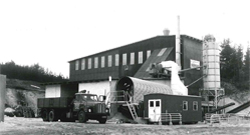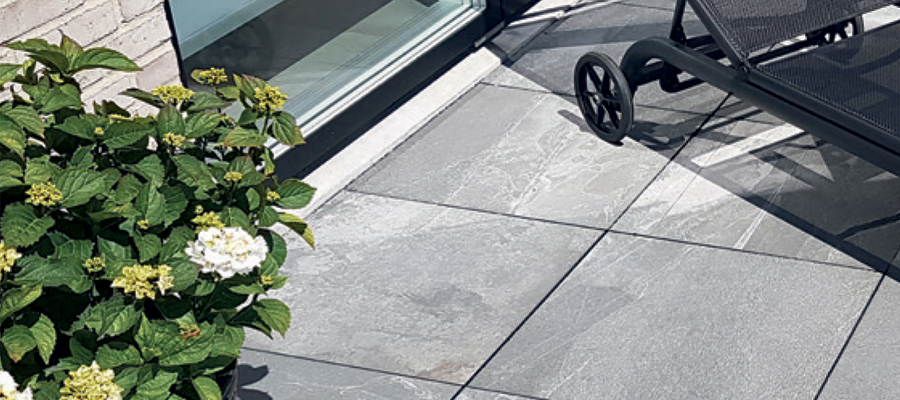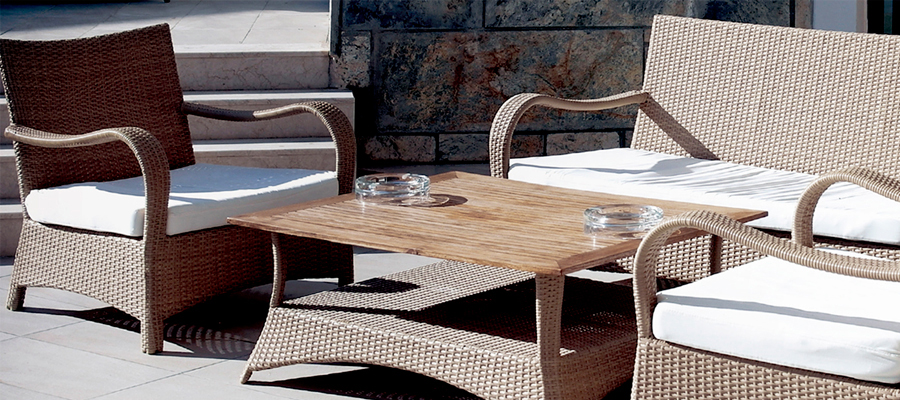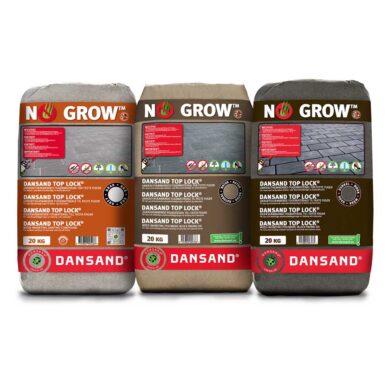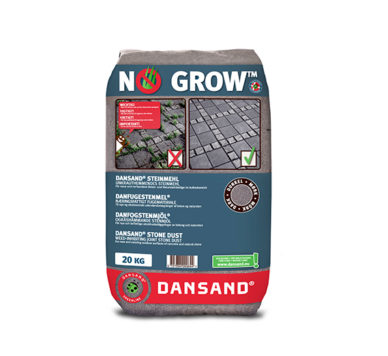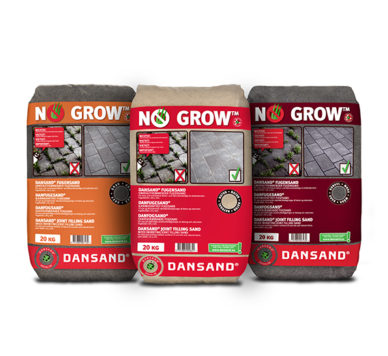
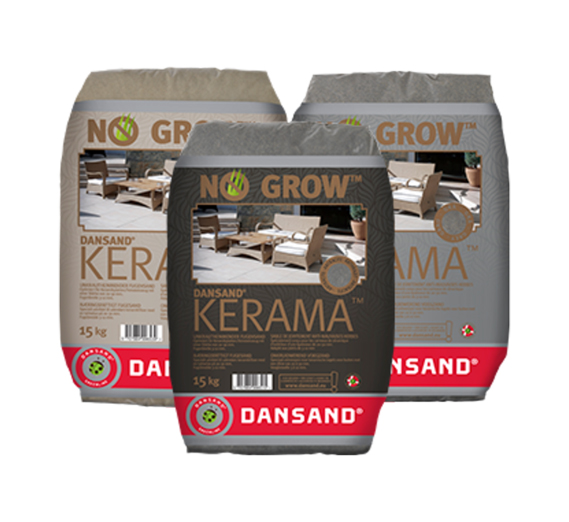
Low-nutrient joint filling sand for outdoor ceramic tiles


Additional information
| Responsible: | |
|---|---|
| E-mail: | |
| Producer: | |
| Tel: | |
| Product designation: | Washed, kiln-dried and sorted silica sand, added minerals and binding agents |
| Item number: | |
| Variant: | Anthracite, Grey, Nature |
| Variants: | Anthracite – 601015, Grey – 601016, Nature – 601413 |
Description
DANSAND Kerama® is a joint filling material for joints between ceramic tiles in patios and outdoor paths.
Most ceramic tiles for outdoor use are no more than 20-30 mm in height. As a result the joint filling material will be washed away fairly quickly and the joints will lose their functionality.
DANSAND Kerama® is produced with a natural binding additive which makes the joints resistant to rain and surface water. Resistance to water is a particularly important feature when using large tiles with a small combined area of joints. With DANSAND Kerama® the joints become more stable and will retain their elasticity.
DANSAND Kerama® creates a low-nutrient environment which makes weed seeds dry out so they cannot set root and germinate. The additives are washed out very slowly; it typically takes about ten years for the effect to disappear entirely. Used correctly, DANSAND Kerama® will give you an attractive, long-lasting result.
Advantages of DANSAND Kerama®
- Suitable for joints from 20 mm in height and a width of 3-10 mm
- Specially developed for outdoor ceramic tiles
- Creates a low-nutrient environment
- Highly resistant to rain and surface water
- Water permeable
- Self-repairing – cracks in the surface of the joints will re-seal once the material is exposed to water
- Also suitable for concrete tiles and natural stones
Specifications
Declaration
DANSAND Kerama® consists of washed, oven-dried silica sand with optimum grain profiles, low-nutrient minerals and a binding agent. Available in neutral, gray and anthracite. Ready to use without mixing.
Packaging
frost-resistant foil bag made from PP plastic.
Storage
Indoor storage recommended. The bags can be stored outside during milder months, preferably under cover. Bags and their contents are not damaged by frost. Store in a dry place in winter. Bags that have already been opened must be tightly closed and kept dry.
Safety
Safety data sheets can be obtained at the following link.
Delivery
15 kg in a water-tight and frost-resistant plastic foil bag.
Environmental info and disposal
The joint material must not be classified / marked as dangerous according to the Ministry of the Environment’s rules for classification and marking.
Residues are handed in at a recycling station. The joint material must not be poured into the sewer. The plastic bags are made of PP material. Place in a container for combustible waste or for recycling.
The authorities’ requirements for the establishment, maintenance and grouting of fortified areas may vary nationally and locally. Therefore, familiarise yourself with the applicable national and / or local regulations before starting the joint work.
| Grain size | 0-1.5 mm |
|---|
Manual
Application
Suitable for patios and pathways. The joint material is for outdoor grouting of new and existing pavings of ceramic tiles with a height of 20–30 mm. Can also be used for pavings with concrete and natural stone. DANSAND Kerama® is only suitable for tiles on unbound surfaces and should only be used in dry weather and on dry tiles. Minimum joint depth must be 20 mm. Joint width can vary from 3 – 10 mm.
How to do it
The ceramic tiles must be laid on a sustainable gravel and sand layer in accordance with the applicable standards for paving work and the tile manufacturer’s recommendations for unbound substrates. DANSAND® Kerama is a water-permeable joint material. Therefore, the base course and screed layer must also be water-permeable. It is important that the paving has the recommended slope to allow water run-off, as the drainage effect of the joints and paving is limited. You achieve the best looking joint lines by using a joint cross. We recommend 3, 4 or 5 mm joint crosses to fix the tiles. DANSAND Kerama® can be used at temperatures above 5° C.
Refitting existing paving
DANSAND Kerama® is not a herbicide. To prevent existing weeds from growing, remove all weeds before refilling the joints. Clean the joints of old joint material to a depth corresponding to the height of the tile. This can be done with a joint scraper. Rinse the joints completely with a high-pressure cleaner. Once all weeds, including weed roots, have been removed, you can fill the joints again.
Maintenance
To prevent weeds and to avoid displacement in the paving, the joint must always be filled to the full height and be free of soil and organic material. Clean the tile area with a soft broom and refill the joints. New DANSAND Kerama® will bind to existing DANSAND Kerama® in the joint. In permanently damp joints, moss and algae may appear. These do not belong to the weed family and must be removed by appropriate means. Alternatively, scrape up the moss-filled joints with a joint scraper and sweep in new DANSAND Kerama®.
Please note
- The joint material is not suitable for bricks and certain highly absorbent or porous natural stones
- Create a small test area (approx. 0.5 m²) to ensure that the joint filling material does not leave a residue on the paving stones
- Do not use the joint material in the joint directly against a plinth or other masonry. Use neutral joint filling sand or laying sand, as otherwise there is a risk of efflorescence on the masonry
- If weather conditions remain dry for a while after filling, efflorescence may appear in the joints. This will normally disappear in rainy weather. Alternatively, it can be removed by watering the paving and the joints gently. Joint efflorescence will decrease in a relatively short time, once the minerals stop releasing excess salts.
- Efflorescence can occur if the material is used under covered areas (carports, etc.). This can be removed with a little water or by using a broom. Efflorescence under covered areas will diminish over time as the excess salts from the minerals diminish.
- Never leave the filling material on the paving stones
| Step 1 | |
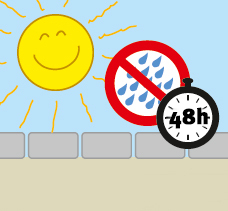 | Before you start filling the joints, please ensure that the pavement and joint filling material are completely dry. Otherwise, the binding agents may stick to the surface of the paving and form a greyish residue. Additionally, please check the weather forecast, as the joints should not be exposed to rain for the first two days. |
| Step 2 | |
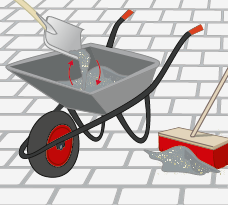 | Mix the contents of a mason jar or a wheelbarrow so that the mineral additives and binding agents are mixed well with the silica sand. Mix the contents from a maximum of two sacks at a time. |
| Step 3 | |
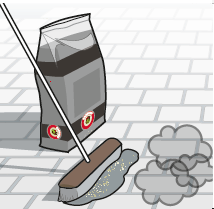 | Sweep the dry filling material into the joints with a soft broom. Sweep diagonally and straight on the joints until they are completely filled. |
| Step 4 | |
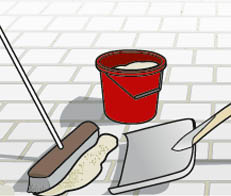 | Sweep the paving completely clean with a soft broom. |
| Step 5 | |
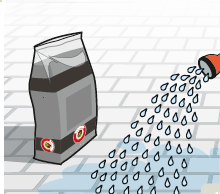 | Now moisten the joints gently using a garden hose set to mist mode to compact the joint material. Wait 1-2 days and refill the joints so that they are completely filled. The surface of the paving should be completely dry when refilling. Finally, sweep the paving clean and repeat the watering. |
| Step 6 | |
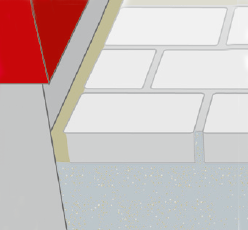 | NOTE! Avoid using the material in the joint directly adjoining the plinth as there is a risk of expansion damage and efflorescence. Use laying sand or something else in the joint adjoining the plinth. |
Vejledning og gode råd

Beregn, hvor meget fugemateriale, du skal bruge. Uanset om du skal fuge en ny belægning, eller blot skal fylde de eksisterende fuger op, er der hjælp at hente her på siden.
Her har vi samlet vores bedste råd til, hvordan du kan opnå de bedste resultater med vores effektive fugeprodukter. Hvilket fugemateriale skal jeg vælge?



